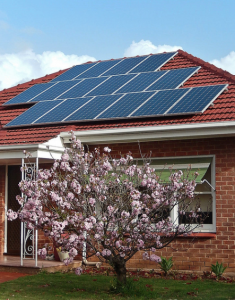So you’re buying a home and are totally in love with the place, except that the doors and windows all but invite cold air inside, the exterior walls have no insulation, and the heating and air-conditioning systems were installed during the Harding administration.
You need an energy-efficient mortgage.
Several federal agencies and many lenders now allow you to finance a wide range of energy-saving home improvements — from tankless water heaters and newer heating and air-conditioning systems to solar panels and geothermal heating — with your home loan.
Fannie Mae, the Federal Housing Administration, and the Veterans Administration, for example, offer loan programs with special benefits for energy-efficient improvements. The cost of the improvements is added to the mortgage, but typically lower energy bills more than offset the higher monthly loan payments.
A report by the U.S. Department of Housing and Urban Development cites, as an example, a California couple that added $2,300 in energy improvements to their home loan. The monthly mortgage payment increased by $17, but the couple saves $45 each month through lower utility bills.
Getting an energy-efficient mortgage begins with an energy-rating survey. A trained examiner will assess the home’s energy efficiency and generate a score using a Home Energy Rating System index. On the HERS scale from 0 to 150, the lower the score, the more energy efficient the home. Factors such as insulation, appliance efficiencies, window types, local climate, and utility rates are used to rate the home and calculate energy costs.
The survey helps determine which improvements are included in the loan. Once the loan is approved and the home is sold, work starts immediately to make the dwelling more energy efficient.
With conventional loans, funding for energy improvements is usually capped at 10 percent of the final appraised value of the property. FHA and VA loans typically have more stringent limits.
By the way, energy-efficient mortgages are also available to current owners — remodelers, as well as those making improvements before they put their home on the market.
Energy-efficient homes are especially attractive to buyers, according to a recent article in U.S. News & World Report. And more than two-thirds of builders and home remodelers report that their customers will pay more money for “green” homes, according to a study by McGraw Hill Construction. In addition, 81 percent of consumers say energy efficiency somewhat-to-very-much affects their homebuying decision, according to the Shelton Group.
(Image: Flickr/Michael Coghlan)
